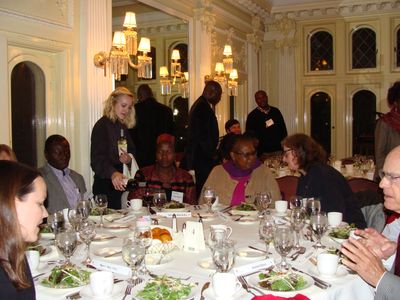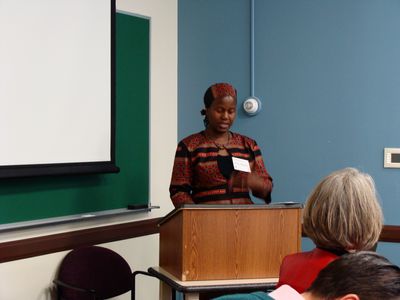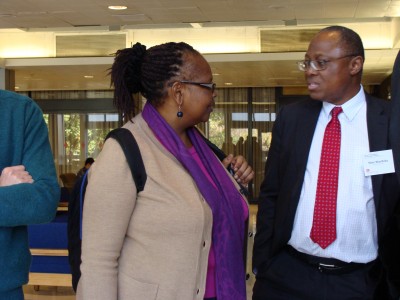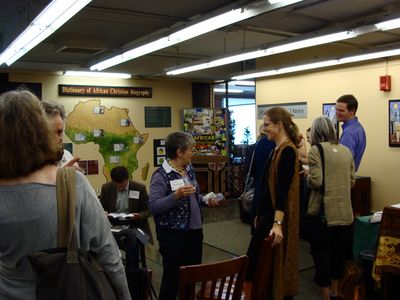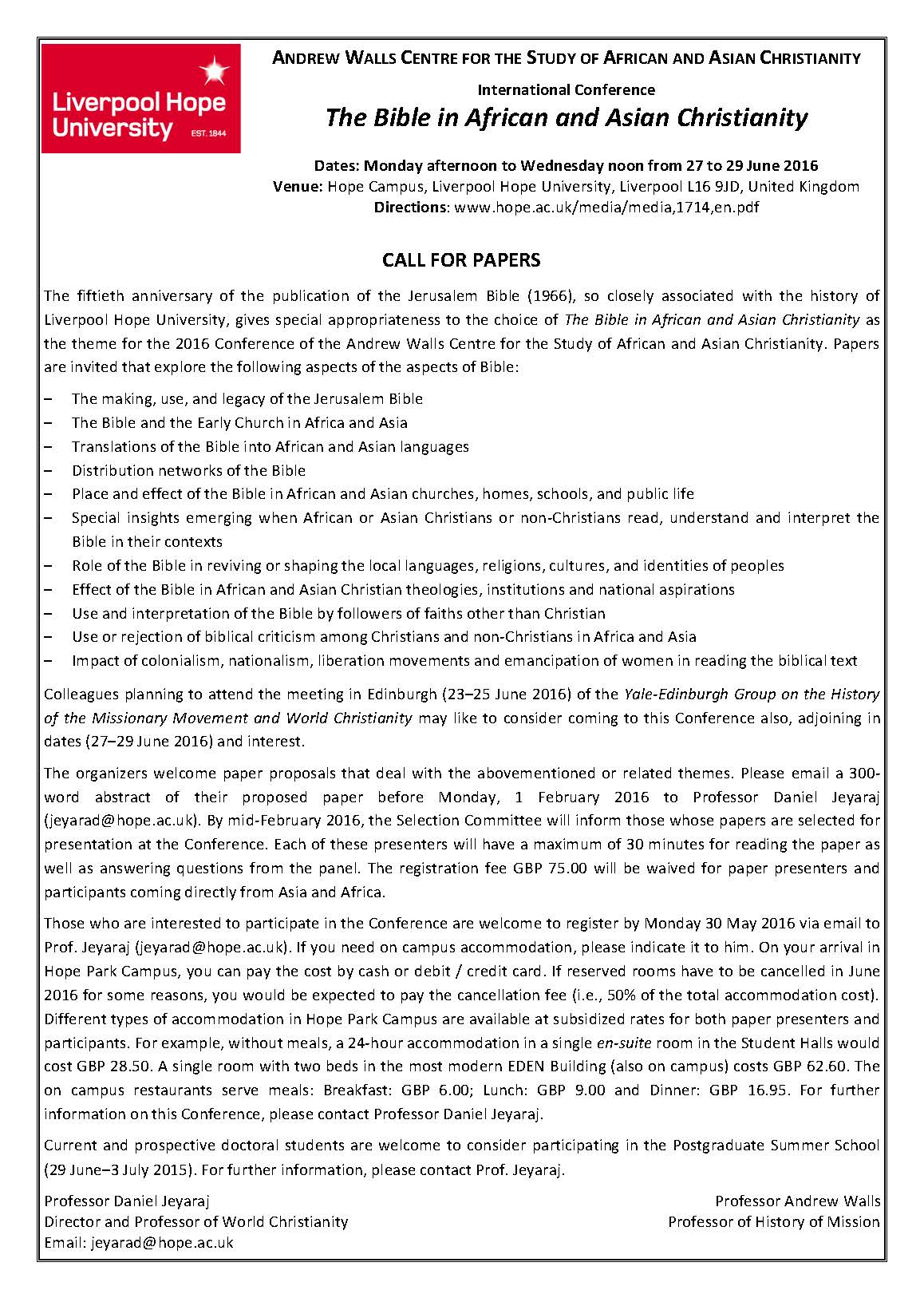News of the extended network of faculty, alumni, students, visiting researchers, and mission partners is regularly updated, and some of the big ideas or major events in Global Christianity are covered in the CGCM News.
Celebrating the Legacy of Saint Theresa of Ávila
On Monday, November 30 there is going to be an academic, literary, and musical gathering to explore the life and heritage of Theresa of Ávila. Check the fliers below for times and location: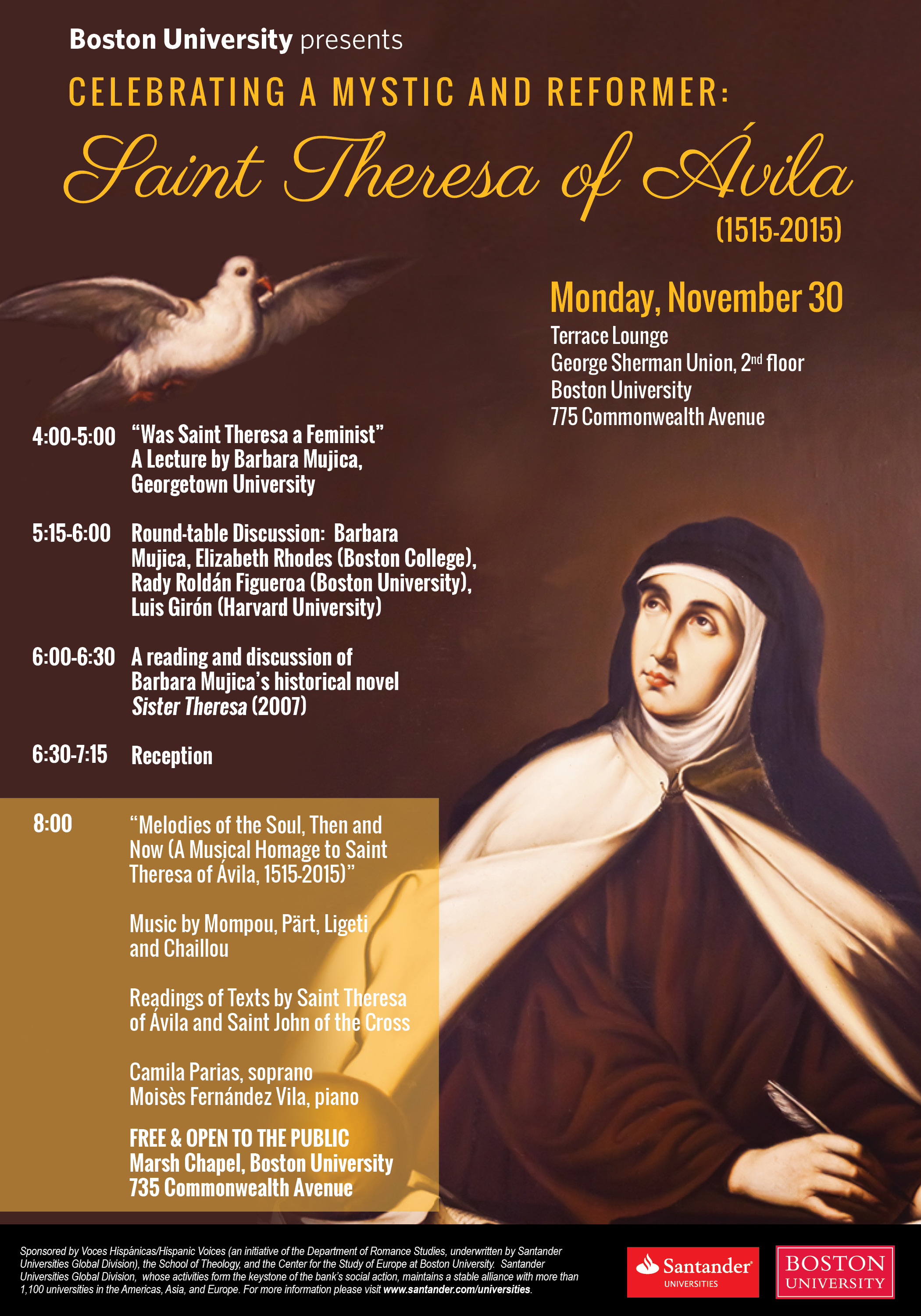

The Indian Presence in the Ecumenical Movement
CGCM visiting researcher Jesudas Athyal's edited book A Light to the Nations: The Indian Presence in the Ecumenical Movement in the Twentieth Century is now available. 
There are a range of contributors in this volume, including Wesley Ariarajah (Former Director of WCC Interfaith department and Professor Emeritus of Ecumenical Theology at Drew University), Fr. K. M. George (Orthodox theologian), Preman Niles (Sri Lankan theologian) and Jayakiran Sebastian (Dean, Lutheran Theological Seminary at Philadelphia).
World Council of Churches Publications makes this important book available, and it can be purchased at the American Academy of Religion conference in Atlanta, GA this year (WCC Publications booth 613), or through amazon: http://www.amazon.com/Light-
Highlights of the “African Christian Biography” Conference
The CGCM hosted the conference on the theme of “African Christian Biography: Narratives, Beliefs, and Boundaries,” from Thursday, October 29 to Saturday, October 31. Approximately sixty scholars and graduate students converged on the School of Theology from Nigeria, Zimbabwe, Kenya, Ghana, Great Britain, and various universities in the United States and Canada to present papers and discuss issues on the theme of African Christian Biography. As an intersection between scholars in religious studies and African studies, the conference was a venue for cross-fertilization between the various fields represented. Furthermore, it was an opportunity to celebrate the twentieth anniversary of the Dictionary of African Christian Biography (DACB).
In the opening plenary, DACB Project Director Jonathan Bonk presented a brief historical overview by looking at the “What?, the Why?, the How?, and the Now What?” of the project. In the Friday morning plenary address, Prof. Lamin Sanneh of Yale University focused his talk on Sir Samuel Lewis whose extraordinary life illustrated the power of human example in the service of religion and society in 19th century West Africa. The afternoon plenary panel with noted scholars Kathleen Sheldon, Richard Elphick, and Diana Wylie addressed, among other questions, the challenge of the portrayal of belief in biography as well as the various uses of biography in historical writing. The dinner plenary by Boston University professor Linda Heywood offered an opportunity to explore the life of a notable 17th century Kongo figure, Queen Njinga.
In the concurrent sessions, questions raised either in the papers or in the subsequent discussion included the role of biography in pedagogy, orality and memory in biography, the use of photography and film in biography, and the use of biography for highlighting the stories of women the Global South. Almost a third of the papers examined the stories of African women, exploring their roles as helpers and leaders, most often unrecognized in the historical record. The discussions also looked at the role of biographers as portrait artists who must paint their subjects with humility and empathy.
In the closing session, the progress of the DACB was praised and many participants offered ideas and challenges for new developments in the future. Conference organizer Dana Robert offered a few words about the book that will be published as a fruit of the conference.
Mission and Mass Incarceration
 Bill Mefford, the United Methodist Church Director for Civil and Human Rights, argued that the way to mobilize churches to challenge the United State's system of mass incarceration is to lead a congregation into "multiplex" relationships with those impacted by the system. Using various illustrations he talked about how "simplex" relationships can
Bill Mefford, the United Methodist Church Director for Civil and Human Rights, argued that the way to mobilize churches to challenge the United State's system of mass incarceration is to lead a congregation into "multiplex" relationships with those impacted by the system. Using various illustrations he talked about how "simplex" relationships can deliver emergency aid or assistance--with one person or group offering another person or group temporary help. But, he went on to explain, to transform a structural problem churches will need to enter multiplex relationships. These are far more complex, demanding, and enduring. They unite people together through friendship, and therefore what concerns one person in the relationship will concern the other. These kinds of friendships, he offered, can be the seeds for change.
deliver emergency aid or assistance--with one person or group offering another person or group temporary help. But, he went on to explain, to transform a structural problem churches will need to enter multiplex relationships. These are far more complex, demanding, and enduring. They unite people together through friendship, and therefore what concerns one person in the relationship will concern the other. These kinds of friendships, he offered, can be the seeds for change.
Call for Papers: Mission/s and the Local Church
EVANGELICAL MISSIOLOGICAL SOCIETY
2016 Call for Papers Mission(s) and the Local Church
Local congregations are increasingly the site in which mission efforts are organized and supervised – with missions committees, missions pastors, missions trips, church-to-church partnerships, etc. How do we bring missiology into closer connection with congregations as mission base? What are the theological and practical implications? How do we help provide missiological insight for those providing leadership within such settings? What lessons learned in mission does the church need to be exposed to in order to not repeat them in the 21st century?
Through papers and interactive discussions we look forward to exploring the different aspects of Mission(s) and the Local Church in the 2016 regional and annual EMS meetings.
At the broadest level, categories related to mission(s) and the local church include, but are not limited to, such areas as:
Strategic, Ministerial, and Operational studies
- Church-to-church partnerships in the global context
- Local church and church multiplication
- Cross-cultural outreach in local church
- Short-term missions
- Internet and mission in local church
- Partnerships in urban mission: urban churches and urban missionaries
- Immigration and the local church
- Mission in immigrant churches: mobilization, recruitment, future generations, and transnationalism
- Congregational practices in diaspora missiology
- Developing missions leaders in the local church
- Finance for missions in the local church
- Relationship between local church and parachurch/mission organizations
- Local church as pre-field training ground for missionary candidates
- Cultural dynamics in mission and the local church
- Mobilization and recruitment in the local church
- Challenges to local church evangelism, outreach, and discipleship: secularism, postmodernism, gender, sexuality, religious diversity, multiculturalism, and multi-ethnicity
Theological, Biblical and Historical studies
- Biblical foundation of missions through the local church
- Missionary nature of the local church
- Who is a missionary?
- Biblical models of missionary involvement of the local church
- Organizational structures for mission in the local church
- Theological and historical studies of mission through the local church
- Historical review of the primary players in world mission: mission agencies or the local church
- The evolution of missions from local church to parachurch and back again
- Mission priorities in the local church: evangelism/outreach or community development
Each category contains a wealth of possibilities for research with practical implications to the way local churches engage in missionary work. Our hope is that the papers presented will provoke lively discussion of some of the most pressing issues facing local churches, mission agencies, missionaries, and national churches.
If you are interested in presenting a paper in 2016, please send an e-mail to John Wang with (1) a working title, (2) a 200-300 word abstract or a couple of paragraphs describing your proposed topic or issue and the approach you will take, and (3) a brief identification of yourself. Accepted papers should be about 4500-7000 words in length and use the Harvard documentation system. Some papers read at the regional meetings will be invited to be read at the 2016 annual EMS meeting, leading to the possibility of being published as a chapter in the EMS monograph for 2017.
The northeast conference is set for April 2, 2016 and will be held at First Baptist Church of Flushing in Flushing, NY. You can email John Wang at fbcjohnwang@yahoo.com or call him at 646-684-7837 to further discuss the details of the conference.
motive for Change
 On September 16, 2015 a digital run of all the motive magazines went live; all, that is, but one. The final issue had notoriously been blocked by the United Methodist Church from being printed. To commemorate motive's digitization, B. J. Stiles, the last editor of motive magazine, donated his prints of that final issue to the School of Theology to make the collection complete.
On September 16, 2015 a digital run of all the motive magazines went live; all, that is, but one. The final issue had notoriously been blocked by the United Methodist Church from being printed. To commemorate motive's digitization, B. J. Stiles, the last editor of motive magazine, donated his prints of that final issue to the School of Theology to make the collection complete.
Beside the gift, a Reader's Theater was organized to capture the impact motive had on various people's lives. The evening concluded with Frank Lloyd Dent, Tom F. Driver, and B. J. Stiles reflecting on the significance of motive, both for them personally and as a religious gadfly. Their talks are available below.
Call for Papers: Translating Christianity
Translating Christianity: Word, Image, Sound and Object in the Circulation of the Sacred from the Birth of Christ until the Present Day
Ecclesiastical History Society Winter Meeting, January 16, 2016, Institute of Historical Research, London
'Translation is always a shift not between two languages but between two cultures’ Umberto Eco
Christianity today is a religion of over 2,000 language groups in the world. Moreover, more people pray and worship in more languages in Christianity than in any other religion and it has been the impulse behind the creation of more dictionaries and grammars of the world’s languages than any other force in history. Behind this lies the fact that Christianity is a translated religion without a revealed language. Translation is its second nature: ‘the Church’s birthmark as well as its missionary benchmark’ in the words of Lamin Sanneh. Accordingly, the transformation of Christianity into a world faith is the direct result of ‘the triumph of its translatibility’.
However, Christianity is also a translated religion in a very different sense. For much of its history (and in the majority of its variants), its ritual practice has been predicated upon the translation of material objects - relics. Their movement in time and space has traced shifting lines of power and influence in illuminating ways, as well as making a significant contribution to the eventual global spread of Christianity.
In turn, missions have been the spur to what, cumulatively speaking, must be the greatest campaign of cultural translation (and description) ever attempted, which even its not infrequent blunders and tragic misunderstandings cannot gainsay. Finally, translation can be understood not only linguistically and physically but also metaphorically, as in the case of the handing on of authority from one place or person to another. This theme and plenary speakers have therefore been chosen with the intention that they might encourage papers which address the issues raised by:
- the challenge of translating or editing scripture, catechisms and related literature from one language to another (to be sung and spoken as well as read)
- the quest for linguistic common ground (by means, for example, of ‘Jesuit Slovak’ or of other so-called ‘general languages’ such as Quechua in Latin America).
- relics, (their discovery, identification, transportation, collection, display and reception)
- the translation of the Christian message as shaped and impacted by various media: from papyrus to the pdf via print and the print/woodcut as well as painting, sculpture and architecture
- missionary narratives as history, hagiography and ethnography
- the challenges of attempting religious dialogue and mediation
- the construction (and deconstruction) of textual canons
- the emergence and practice of vernacular worship.
Plenary speakers:
Joel Cabrita (Cambridge), Scott Johnson (Oklahoma) for the Winter Conference
Simon Ditchfield (York); James Grayson (Sheffield, emeritus); Anne Lester (Colorado at Boulder); Joan-Pau Rubiés (ICREA, Barcelona) all for the Summer Conference
If you wish to submit a proposal for a communication (lasting 20 minutes) to be given at the Winter meeting, please use the form here. Please note that we have now extended the deadline for submitting proposals to 15 October 2015.
Call for Papers: The Bible in African and Asian Christianity
Dear Colleagues and Friends,
Recent STH Graduates Commissioned as UMC Missionaries
Two recent graduates of Boston University's School of Theology, Janjay Innis and Andrea Rocha Soares, were commissioned as missionaries for the United Methodist Church. Soares will serve as a regional missionary in South America, focusing on ministries to women, youth, and children. Janjay Innis will serve as a mission advocate for young adult mission service through Generation Transformation.
Education as a Mission
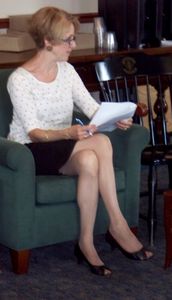
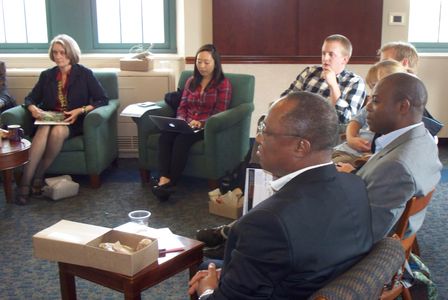 On September 25, Professor Liz Parsons gave a lecture about her new book The Greatest Work in the World: Education as a Mission of Early Twentieth Century Churches of Christ. She spoke about her research on the exchanges written between Lloyd Cline Sears (1895-1986) and Pattie Hathaway Armstrong (1899-1977), two prominent leaders of Churches of Christ. She talked about the major themes she found in these letters, mainly focusing on their educational philosophy and their counter-cultural perspective. Jeremy Hegi, a third year Ph.D student, responded. There was a lively discussion concerning the practical implication of the letters for contemporary American Christians. Many CGCM faculty members and students joined the discussion.
On September 25, Professor Liz Parsons gave a lecture about her new book The Greatest Work in the World: Education as a Mission of Early Twentieth Century Churches of Christ. She spoke about her research on the exchanges written between Lloyd Cline Sears (1895-1986) and Pattie Hathaway Armstrong (1899-1977), two prominent leaders of Churches of Christ. She talked about the major themes she found in these letters, mainly focusing on their educational philosophy and their counter-cultural perspective. Jeremy Hegi, a third year Ph.D student, responded. There was a lively discussion concerning the practical implication of the letters for contemporary American Christians. Many CGCM faculty members and students joined the discussion.
